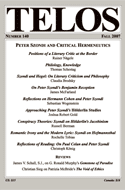Telos 140: Peter Szondi and Critical Hermeneutics is available in our store.
 Literature has been a long-standing, if sometimes hidden, topic for Telos. While the journal has ostensibly focused on social and political theory, in various traditions and stretching from philosophy to culture, matters of literature have frequently percolated between the lines. This interlinear presence has certainly been the case for our engagements with those thinkers who made major contributions to literary and aesthetic theory, such as Adorno, as well as Baudrillard, Benjamin, Goldmann, Gramsci, and Lukács, but more broadly to the wide-ranging efforts to interpret and reinterpret works of the past: Telos has been about rereading, recovering, and reinterpreting parts of the intellectual legacy with reference to questions of current urgency. While the journal did succeed in keeping a healthy distance of common sense from the vanity fair of “literary theory” that gripped the universities during the 1980s and 1990s, our interest in mapping alternatives to the mentalities of bureaucracy—traditions, communities, the life-world, and religion—also indicated an underlying interest in literature, as well as in the arts in general. This testifies, of course, to the legacy of Critical Theory and the effort to correct the dominance of instrumental reason with an aesthetic dimension; but there is a much bigger picture, beyond the specific confines of Critical Theory per se, the pursuit of a richer life and a resistance to all the cultural and social forces that degrade human creativity and freedom, whether one attributes them to modernity or to conditions of longer duration. As a vehicle that can enhance imagination and expressivity, literature turns out to be indispensable.
Literature has been a long-standing, if sometimes hidden, topic for Telos. While the journal has ostensibly focused on social and political theory, in various traditions and stretching from philosophy to culture, matters of literature have frequently percolated between the lines. This interlinear presence has certainly been the case for our engagements with those thinkers who made major contributions to literary and aesthetic theory, such as Adorno, as well as Baudrillard, Benjamin, Goldmann, Gramsci, and Lukács, but more broadly to the wide-ranging efforts to interpret and reinterpret works of the past: Telos has been about rereading, recovering, and reinterpreting parts of the intellectual legacy with reference to questions of current urgency. While the journal did succeed in keeping a healthy distance of common sense from the vanity fair of “literary theory” that gripped the universities during the 1980s and 1990s, our interest in mapping alternatives to the mentalities of bureaucracy—traditions, communities, the life-world, and religion—also indicated an underlying interest in literature, as well as in the arts in general. This testifies, of course, to the legacy of Critical Theory and the effort to correct the dominance of instrumental reason with an aesthetic dimension; but there is a much bigger picture, beyond the specific confines of Critical Theory per se, the pursuit of a richer life and a resistance to all the cultural and social forces that degrade human creativity and freedom, whether one attributes them to modernity or to conditions of longer duration. As a vehicle that can enhance imagination and expressivity, literature turns out to be indispensable.


